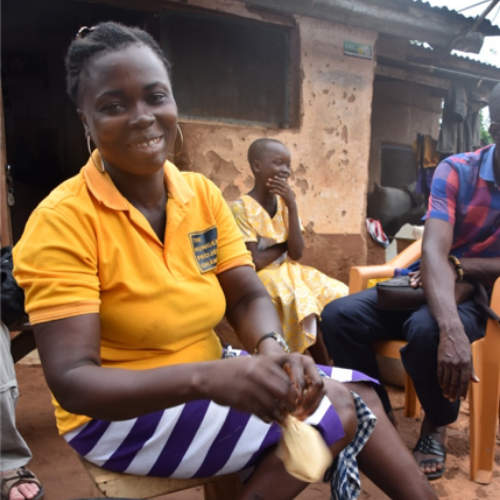We work with communities in Africa to enable them to move from aid-dependency to a life of self-reliance. Find out how Rebecka was able to do just that. By growing her business from the ground up she has built a different future for not only her family, but generations to come.

Rebecka Nati is a farmer who is married with five children.
She is from Boti in the eastern region of Ghana, Africa, where our Epicentre Strategy is at the core of our work. We work with local people who understand the cultural, social, economic, political and environmental challenges, and have the collective aim of building a self-reliant future.
We bring communities together to form a central hub where key infrastructure is housed, develop the leadership capacity of people in the community - for themselves and their communities, and engage local government to support the communities by including their activities in government development plans.
Community-led development, effective partnerships and empowering women to be key change agents are the pillars that shape what we do no matter where we work. We have seen the power of this approach and we know it works. Through our partnership, we have seen more than 700,000 people in Africa shift from a life of resignation and handouts to a fulfilling and dignified life of self-reliance.
Before the epicentre, the area here was quiet, but since the epicenter was built there is life and movement and a lot of people here. Many people come to the epicenter and rent the epicenter hall for different programs, which means that I get many new customers. The epicenter has changed the area here a lot.”
Rebecka Nati, business owner in Boti, Ghana
Rebecka participated in our microfinance program to grow her business.
She has taken three loans. Her first loan was 100 cedis, which she invested in her palm oil and agriculture business, made a small profit, repaid the loan and took two more loans. With the last loan she bought a motorcycle which she now leases. Motorcycles are useful for transport in rural communities.
Her husband also has his own business, but now that she earns her own income.
"My husband helps me with my business, but I take care of the money. My money is my money.”
Now that she's economically empowered, she has the opportunity to let her children go to school, which dramatically changes the opportunities available to them and enables them to make decisions about their future.
She has plans to expand her business so that she can move from the family farm and build her own house for her husband and children.
"I need to buy larger pots for the palm oil, so that I can produce larger quantities. When I have paid off the latest loan, I want to take another one to buy the pots."
It’s a big encouragement for me to have my own business. I feel proud to be self employed and not work for somebody else.
Rebecka Nati, business owner in Boti, Ghana
When women are economically empowered, it has an amplifier effect in the community and all of society benefits. If you’d like to invest in women like Rebecka so they can build a different future for generations to come, click the button below.







